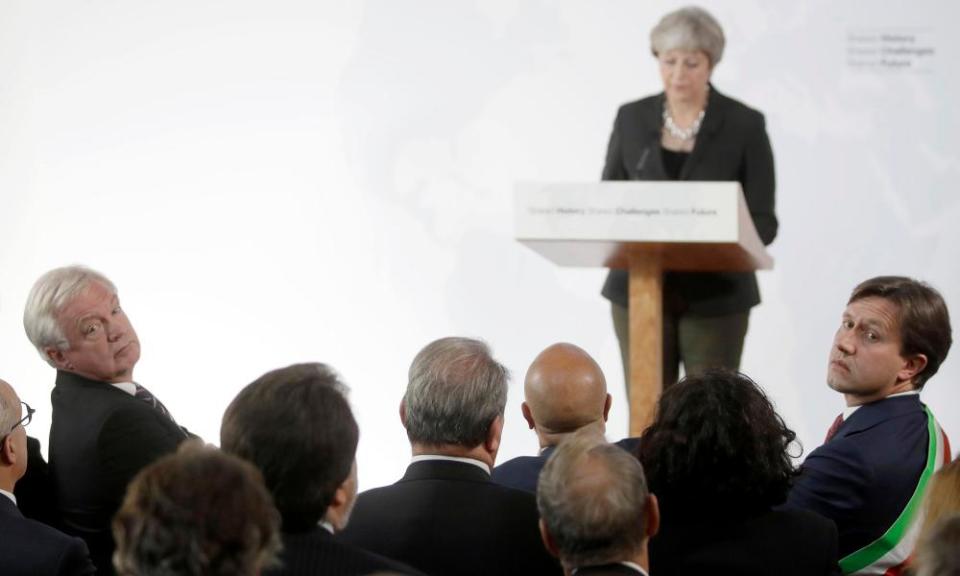Leading EU figures react to Theresa May's Florence speech

Michel Barnier, the EU’s chief Brexit negotiator, has welcomed Theresa May’s Florence speech as “a step forward”, but stressed that Brussels would have many questions for the British side about the “concrete implications” of her words when the fourth round of Brexit talks get underway next week.
“The speech shows a willingness to move forward,” he said, after the prime minister ruled out the “have cake and eat it” approach to negotiations favoured by leading Brexiters.
In her speech on Friday, May asked EU countries to agree to a two-year Brexit transition, during which the UK would continue to enjoy unfettered access to the single market. She said the UK did not “pretend that you can have all the benefits of membership of the single market without its obligations”.
In a statement, Barnier acknowledged May’s concession that the UK would pay into the EU budget until 2020, which guarantees €20bn (£18bn) of funds promised by the government. But the EU will be looking for reassurances that the UK will pay a share of the EU’s unpaid bills, pensions and other liabilities, totalling at least €40bn.
However, Barnier also highlighted that May’s speech did not clarify how the UK intended to honour its responsibility for protecting the peace in Ireland, while observing EU trade and customs rules.
Barnier welcomed May’s promise to protect the rights of EU citizens, but said this must be translated into a precise negotiating position. “We look forward to the United Kingdom’s negotiators explaining the concrete implications of prime minister Theresa May’s speech,” he said.
In her speech, May said EU citizens arriving during the transition period would benefit from free movement. Poland’s EU affairs minister, Konrad Szymanski, struck a similar note to Barnier, saying May’s offer needed to be “re-confirmed” at the negotiating table. “Only progress made at the negotiating table will allow the European Council [of EU leaders] to conclude that the sufficient progress has been made.”
Ireland’s Taoiseach, Leo Varadkar, said May’s call for a two-year transition period was a “step in the right direction”, although clarity was needed. He said he was particularly happy about May’s reassertion of support for protections for Northern Ireland’s Good Friday peace deal, and for a frictionless border between Ireland and Northern Ireland.
Guy Verhofstadt, the European parliament’s Brexit co-ordinator, said the UK position was “becoming more realistic”, but lacked detail about the future relationship. “We heard a lot about what the UK doesn’t want (the single market, the customs union, the EEA [European Economic Area] or an FTA [Free Trade Agreement],” he said in a statement. “We hope to hear from them soon how they see the ‘deep and special partnership’ with the EU,” he said, throwing May’s slogan back at her.
Members of the European parliament sounded a more critical note. The leader of the centre-right European People’s party in the European parliament, Manfred Weber, said May had brought no more clarity to London’s positions. “I am even more concerned now,” he tweeted. “The clock is ticking and time is running faster than the government believes in London.”
Ingeborg Grӓssle, a German centre-right MEP, who chairs the European parliament’s budget control committee, told the Guardian that things remained “as vague as before”.
“We thought it might be a speech for Europeans, but in fact it continued to be a speech for the UK,” she said.
Grӓssle welcomed May’s words for the 3.5 million EU citizens in the UK, in which the British prime minister said: “We want you to stay.”
But the MEP voiced irritation with May’s call for “a creative solution” to the UK’s future trading relationship with bloc. “She put forward a lot of contradictory positions ... as if it is a matter of creativity. It is not a matter of creativity, it is a matter of logic and respect of basic EU law.”
The harsh response from MEPs will complicate life for the British government, as the European parliament has the power to veto a Brexit deal.
The main themes of the EU response have been in plain sight since EU27 leaders drew up Barnier’s negotiating mandate in April, a document that cemented the bloc’s negotiating stance.
Barnier referred to it again when he said there would be no bespoke transition deal: the UK would have to accept the EU’s “regulatory, budgetary, supervisory, judiciary and enforcement instruments and structures”.
This means the UK must accept free movement of people, pay into the EU budget and observe the jurisdiction of the European court of justice and all EU laws during the two-year transition May is seeking.

 Yahoo News
Yahoo News 